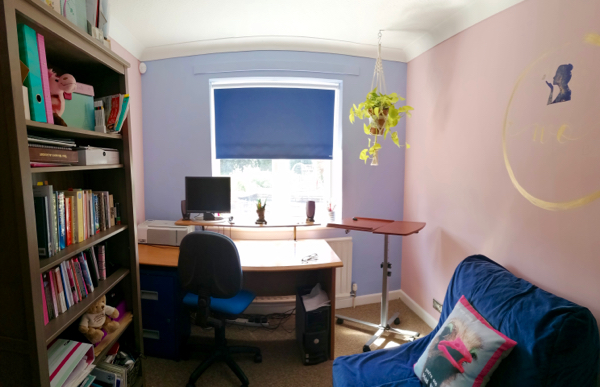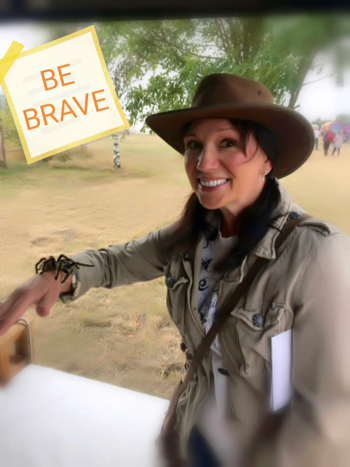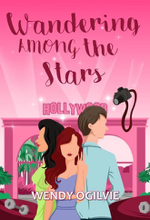If you’re thinking about starting a freelance editing business, check out what editor Wendy Ogilvie has to say.
As is true for most writers, I have always written in some form, whether it be rude poems for office birthday cards or stories to scare my niece, but it wasn’t until 2015 that I decided to start my first novel.
This was when I studied with The Writers Bureau, which really helped hone my skills and gave me an insight into what outlets there were if I wanted to make writing a career.
I had been a personal trainer and fitness course tutor for twenty-five years and as much as I loved it, I wanted to find out if I could make a part-time income from writing.
I didn’t want to wait until that time when my young clients could do more press ups than me!
I Started by Writing Blog Posts for My Own Website
I began by writing blog posts for my own website and then guest posting for other websites on a similar subject.
I got my first paid job as a writer from the Problogger jobsboard. I then went on to write for Books Like This One, a book recommendation site, and at the same time I began writing chapters for a publishing company that produces novellas.
I wanted to write my own stories too and I wrote my first book on a netbook on my dressing table: Wandering on the Treadmill. It was about a newly-qualified personal trainer called Wanda who enters a fitness competition.
It took five years but I was in no rush. Once I’d published it, I really wanted to write a thriller, so during NaNoWriMo I started The36Club but didn’t get to finish it as people reading my first Wanda novel kept asking when the sequel would be out.
So I used the next NaNoWriMo to start the sequel: Wandering Among the Stars.
The Day I First Started Considering a Freelance Editing Business
I wanted to edit my books to a high standard before passing them to a professional so I began to learn as much as possible about the editing process. Improving the readability of my stories was a challenge and I loved it.
One of the highlights in my writing journey was when I sent my second book to a professional editor for a critique and she sent me this:
I loved it! I either want to adopt you or be your new BFF … I know you paid me to critique it but I loved the characters and the story and couldn’t stop reading. I honestly couldn’t find anything to critique …
That was a good day. That was the day I realized editing was more than just a necessity for me – I was actually rather good at it.
How the COVID-19 Lockdown Inspired Me to Start My Own Freelance Editing Business
When [COVID-19] lockdown began [in early 2020], we were on holiday in Suffolk in a log cabin.
I was still personal training and writing at that time and it wasn’t until the latter part of the week, while we were mountain biking through the woods, that I realized I wouldn’t be able to continue my personal training business while self-isolating.
I’d been thinking about making editing my new career and this was the moment I decided it was time to start a new phase in my life. I made the decision to start WordsWorth Editing.
By this time I was already halfway through a proofreading and copy-editing course and had been editing for my writer group, Basildon Writers, and several online health websites. I felt ready to take the next step – but I needed a bit of hand holding.
This is when I discovered Louise Harnby. She is an amazing fiction editor and her website has tons of free information and tips on editing and writing.
I began connecting with her on LinkedIn and decided I would check out her book Business Planning for Editorial Freelancers. I read through the entire book making a business plan and took one step at a time so I wasn’t overwhelmed.
She also produces The Editing Podcast with Denise Cowle (non-fiction editor) and I would take a long walk each day and listen to the podcasts and stop to write down any tips.

The Most Successful Freelance Editing Businesses Have Specific Areas of Expertise
Finding your niche, whether you are a writer or editor, is crucial.
It’s very tempting to want to advertise your services to the widest possible audience but the most successful businesses have very specific areas of expertise or at least stick to two or three within a similar field.
Think of that one skill you have that doesn’t feel special to you but someone else says “How do you do that?”
It could be anything from knitting jumpers to being an excellent public speaker. It’s surprising how many skills we have that others would like to learn.
Figuring out my niche was easy: I have a sports science degree, diploma in health management and about thirty years experience in the health and fitness industry.
I’m also an English tutor and have written non-fiction and commercial fiction so my main focus is non-fiction health and wellness but I also take on fiction in my chosen genre: women’s commercial fiction.
Of course, you can edit any kind of writing but I had to edit a car review once and it took me twice as long as I had no idea whether the text was correct or not and had to keep looking it up.
I am currently working with two authors on health-related books and I can immediately identify any incorrect industry spellings or facts. I can also make positive suggestions based on my many years of experience.
When It Comes to a Freelance Editing Business, I’m a Self-Confessed Entrepre-Not
When it comes to business, I’m a self-confessed entrepre-not: I am not business-minded or driven by money and the thought of running a website and interacting on social media makes me yawn.
I struggle to fit in the time for social media unless it’s for business; I love to experience everything but don’t feel the need to photograph it and show everyone else!
Unfortunately, I wanted to start a business and I needed to know how to reach potential clients, so I took what I love – learning – and used that to keep me focused.
One of the biggest lessons I’ve learned was to invest in myself and my business. Investing in myself whether it’s an editing course or new software was a lesson I learned from a book called High Performance Habits by Brendon Burchard.
Another important lesson I got from a blogging course I did by Jeff Goins called Intentional Blogging, was to give away your best stuff. For example, if you are writing or editing a blog post for free to get some work for your portfolio, don’t think because you’re not getting paid, you shouldn’t give them your best work. Think of it more as an investment in your future business.
I have since got work via recommendations from free edits I did for potential clients.
6 Steps to a Freelance Editing Business Plan
Although I was used to dealing with my own taxes from being a self-employed personal trainer, building an online business was daunting. I just gave myself two things to complete each day so I wasn’t overwhelmed.
Below is a rough outline of how I broke the project up into manageable steps.
Step 1 – Which aspect of editing do I want to concentrate on?
There are so many areas of editing you can specialize in from proofreading to indexing and fact checking.
I started with copy-editing as it was one of my strengths but as any editor will tell you it’s not always as simple as that. My current job was originally for a copy-edit with extensive re-write but it hadn’t been through a structural edit so I had to get the book in a logical, readable order before even starting with the copy-edit.
Step 2 – Work out organizations/people to target based on my skill set and qualifications.
Health bloggers.
Health-related online magazines.
Indie authors.
Writing circles.
Local university – Who often take on freelancers from the local area.
Leave my card or flyers with the local library.
Step 3 – Determine my training needs.
Proofreading course (including BSI proof-correction marks).
Copy-editing course.
Join the Chartered Institute of Editing and Proofreading (CIEP).
Editing digital Content course.
Step 4 – Set up my office space and systems required to run my business.
Registering for tax and having an accounting system.
Invoice system.
Determine my charges (CIEP has a good PDF on the industry standard charges for different forms of editing.)
Set up terms and conditions. (Again, CIEP has a template available for download.)
Time tracker – to track your hours and exports timesheets.
Redecorate my office. (It had concrete floor and was a dismal color.)
Editing Macros – Paul Beverley free download
Step 5 – Marketing
Make sure I have an online presence.
Learn about the various ways to promote my services including email, phone and promotions.
I mainly use LinkedIn for business and Twitter to connect with other writers and editors.
I also have a basic website in progress. Luckily for me, I have been so busy actually working, I haven’t had time to put many of my marketing plans into place – but I will.
Step 6 – How can I get some initial experience?
Offer free editing to everyone in my writer group.
Offer my skills to anyone I know who runs a business.
My Forensic 500 Service for Authors
The Forensic 500 is a service I offer authors and is something I’ve been working on for about four years as it is a particular skill.
I take the first 500 words of a client’s story/novel and put each sentence under a microscope advising the client where they are going right or wrong with regard to choice of narrative viewpoint, word choice, grammar, tense, sentence flow and structure, relevance and rhythm.
This is an extremely budget-friendly way for the author to get some feedback on their personal tics and strengths. It also helps them to really think about what they are writing and how to improve the rest of their story. This in turn means that when it comes to getting their final manuscript edited, it will be in good shape and will save them money in the editing process.
Forensic 500’s are fun to do but the most lucrative way to earn money as an editor is to gain some business clients as they pay well for a relatively short piece of work. If they keep coming back to you, the money will exceed anything you get for working on a single book.

Advice for Other Editors Thinking About a Freelance Editing Business
If a young editor or writer came to me for advice on how to make it their career, I would start by telling them to brush up on their punctuation and grammar skills.
Trust me, whether you are a writer or would like to turn your hand to editing, having a good knowledge of these basic skills will help you in so many ways.
When I’m contacted by a potential client, I will ask for a sample of the book before giving any quotes as a well-written manuscript with attention to grammar and punctuation, won’t take as much time as work that is riddled with errors.
Even if you are a writer looking to break the writing rules, you need to know how the rules of grammar work before you can break them.
TIP: I teach English part-time and often give my students online games to play at the end of a lesson to reinforce what we have been learning. Don’t think these are just for kids; they’re a great way to have fun and brush up on your skills. Plus, they are often free!
I would also suggest doing a free or low-cost sample edit for new clients so you can both decide if you’re a good fit for their project.
The last thing I would tell a newbie is Be Brave! Faint heart never won editing contracts. (I think that’s how it goes.)
Tips for Getting Started as a Freelance Editor
Here are a few tips that have helped me get started. Some you are probably aware of but hopefully you might find something new to make you go, “Oooh good idea.”
Keep a word diary/dictionary of any words you come across that you’ve had to look up. I give my students a pimped-up book with their name on to put their own words in. You’ll be amazed at how often you use it.
Get a stand-up desk – sitting all day is not good for your body (or your butt!).
Whether you have your own office or a desk in the bedroom, make it yours and make it a pleasant place to work. It’s surprising how much it can lift your mood when you’re busy. I decorated mine myself and even managed to paint my logo on the wall.
Join CIEP or other professional body so you can connect with like-minded souls and get help when you need it.
Be confident in the experience and ability you have but keep on learning – we all suffer from imposter syndrome from time to time but shove in your desk drawer and remind yourself of how far you’ve come.
Do an excellent job, even go above and beyond, as your client will come back to you again and again.
Learn how to use Word – it has so many capabilities. I now teach my writing group a new editing tool each month.
If proofreading is your main area of expertise, invest in a writing slope. It is much kinder on your neck and shoulders.
Lastly, and most of you probably already know this – never try and edit your own work. Pass the final draft to another editor!
* * *
 Wendy Ogilvie is a writer and editor providing services to businesses and individual clients. She has been working in the health and fitness industry for twenty-five years as a course tutor and personal trainer. She is also tutors English in her spare time.
Wendy Ogilvie is a writer and editor providing services to businesses and individual clients. She has been working in the health and fitness industry for twenty-five years as a course tutor and personal trainer. She is also tutors English in her spare time.
She currently specializes in non-fiction health and wellness and women’s commercial fiction. After working for a publishing company for a few years, she decided to set up her own editing business.
Her freelance editing business provides the following services:
• Copy-editing, extensive re-writes and proofreading.
• Forensic500 — An in-depth look at the first 500 words of a story or novel. It is an excellent tool for improving an author’s writing skills.
For more information on Wendy and her work, please see her website or Amazon author page, or connect with her on Twitter and LinkedIn.
 Wandering Among the Stars: Wanda’s ambition of being a celebrity personal trainer in Hollywood has just become a reality. But an incident in a restaurant with A-lister client, Madeline Harvey, lands them both in jail and Wanda desperate to hang on to her new career.
Wandering Among the Stars: Wanda’s ambition of being a celebrity personal trainer in Hollywood has just become a reality. But an incident in a restaurant with A-lister client, Madeline Harvey, lands them both in jail and Wanda desperate to hang on to her new career.
Luckily for her, things work differently in La la land and Wanda’s kick-ass approach gains her a new client — the mysterious Ethan Caldwell. This puts her career back on track until, during an interview, Madeline credits her new youthful look from a cosmetic procedure to Wanda’s innovative training programme. Now the rest of the world wants in on the secret.
With her ambition treadmill set to full speed, can Wanda invent the new training method she’s been credited with and find out Ethan’s secret under the scrutiny of an over-ambitious journalist? Or will her legs buckle under the pressure?
Available on Amazon.

